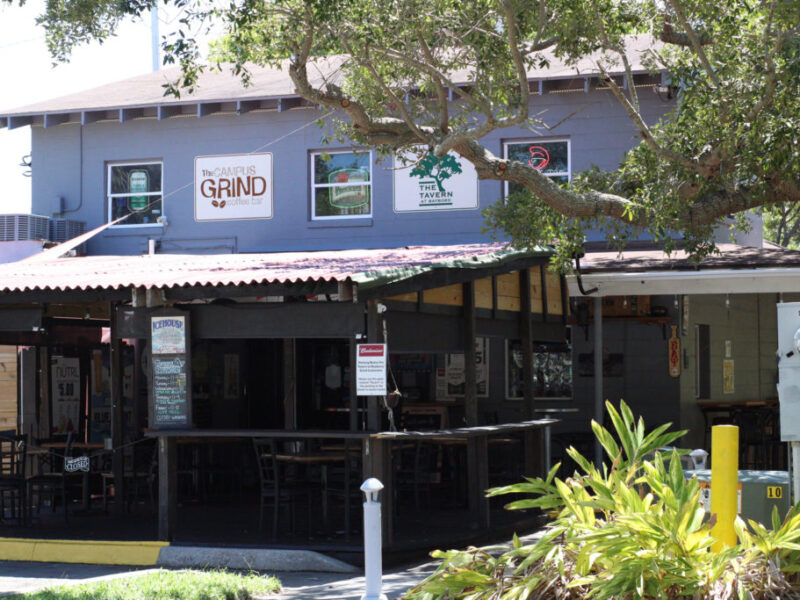By WENDY JOAN BIDDLECOMBE AND CHRISTOPHER GUINN
Regional Chancellor Margaret Sullivan became the third top executive at USF St. Petersburg within a decade to vacate or be removed from the position earlier than expected and earlier than any of the leaders had wanted.
Sullivan announced her resignation in a letter addressed to the USF St. Petersburg campus community on June 25. “This was not an easy decision,” she wrote. “I have enjoyed my three and a half years leading this fine institution and we have accomplished much together. But I feel in my heart that the timing is right.”
Her last day is August 2.
The resignation came soon after a decision by USF President Judy Genshaft to convene the search for a new chancellor in the fall, as prescribed in Sullivan’s contract and supported by the Faculty Senate.
Sullivan had hoped to continue as chief executive, said sources close to the chancellor, but made the decision earlier in the year that she would not finish her term without the expressed support of the USF system and the faculty, that is, if an extension to her contract had been offered.
The potential search had been a standing issue in the Faculty Senate throughout the spring semester. On May 4, the senate sent a letter to Genshaft requesting the search begin.
“The Senate has given an opportunity for all faculty constituents to provide their input on the progression of leadership at USF St. Petersburg beyond June 2013. Based on that input, we have no conclusive information that would lead us to recommend any delay or deferment of the initiation of a search,” said a letter signed by then-Faculty Senate President Christopher J. Davis.
The letter continues: “The Senate appreciates both the significance of and sensitivity to any change at this level. However, we feel that the process presents a unique opportunity not only to provide a strong mandate for our leader but also to articulate the
vision and direction of this institution and the wider USF System. Therefore, we do not view this letter as the culmination of our involvement, and look forward to collaborating with you on any further phases of this process. It also reaffirms the commitment to shared governance and ameliorates any risk of faculty becoming disenfranchised.”
According to several members of the College of Arts and Sciences, however, the senate did not hold a formal conversation with faculty to discuss the possibility of a chancellor search, and the letter did not mention the College of Arts and Sciences’ overwhelming support to extend Sullivan’s contract.
Several members of the college issued counter letters to Genshaft, claiming the senate did not represent the majority view on campus.
Christopher Meindl, who serves as chair of College of Arts and Sciences Faculty Council, said the senate discussed a possible faculty forum to discuss campus leadership during a March meeting. Meindl said after a few weeks of hearing nothing other than “hallway chatter,” he decided to informally poll CAS faculty.
The poll was simple: faculty voted whether or not they would like to see Sullivan stay on as chancellor for at least a few more years. Faculty were given a working week to respond to their department chair by email—37 voted to retain Sullivan, one voted to start a search, three abstained and 14 members did not vote. The results, according to Meindl, were submitted to the senate in mid-April, a few weeks before the Senate’s final meeting of the semester.
Meindl said he was “flabbergasted” the Faculty Senate did not include the college’s overwhelming support to keep Sullivan as chancellor. According to the USFSP website, the College of Arts and Sciences employs 62 full time faculty members, as opposed to 57 in the College of Business and 20 in the College of Education. Meindl said campus staff should have been asked for their input, as well.
The letter was “crafted carefully to reflect input from all faculty,” Davis said.
Davis questioned the “formality” of the CAS poll, adding the possible search for a new chancellor is an important decision requiring ample time to “fully engage” faculty, students and staff.
“The Senate has gone to great lengths to ensure the integrity and timeliness of this process,” Davis said.
In response to the May 4 letter, Meindl and four other faculty members sent a letter to Genshaft, disagreeing with the senate’s conclusions. The letter, dated May 14, was signed by Bob Dardenne, Hugh LaFollette, James McHale and Melanie Riedinger-Whitmore, who said they wrote on behalf of a “substantial number” of faculty members.
The letter said the “inconclusive finding is just as much an argument for retaining” Sullivan, who has served as regional chancellor since spring 2009.
“We think that this is a terrible time to throw USF St. Petersburg into uncertainty, given what’s happened recently in Lakeland. This, in fact, is the very time this university requires stability, a stability it has had under the regional chancellor for several years now. We see no reason, short of a vote of no-confidence (which surely has not happened), to remove a regional chancellor who has guided the university through a successful SACS accreditation, kept it financially sound during a time when many universities aren’t, and has provided a stability, even in hard times, that has allowed us to focus on issues important to educating our students and developing our faculty,” the letter said.
James McHale, chair of the department of psychology, said he knew of “three distinct groups of faculty views” on Sullivan’s leadership. The first group was concerned with Sullivan’s appointment by Genshaft in 2009, and thought faculty ought to have been included in the process. The second group, which McHale said he is a part of, shared concern over Sullivan’s appointment but was “won over by her leadership, student-centered values and financial stewardship through turbulent financial times.”
A third group proposed extending Sullivan’s contract for two or three more years to encourage more “deliberative discussions about USF St. Petersburg’s future.”
“[Dr. Sullivan] has the courage of a lion,” McHale said. “It is hard to imagine finding anyone who could step in with the maturity and wisdom that would allow her or him to ably plunge into the unpredictable and complex USF system and state legislative political waters that Dr. Sullivan has navigated so masterfully.”
McHale and the other CAS faculty members who wrote Genshaft on May 14 were concerned with the possible turbulence associated with an interim leadership, as well as the lack of communication between the Faculty Senate and USF St. Petersburg faculty and staff. McHale said the Faculty Senate’s recommendation to begin a search was “impetuous and unnecessarily rushed,” and the conversation for new leadership should have started in fall 2011. McHale said the senate process “seemed cloistered and insular.”
“I respect my Senate colleagues greatly and hold them in the highest regard, but am discouraged by what transpired in the Senate this year,” McHale said.
Neither the senate nor the dissenting faculty members received a formal reply from Genshaft, said USF spokesperson Lara Wade. However, Genshaft instructed Davis during a phone conversation on the morning of May 11 to inform Sullivan officially of the senate’s decision.


